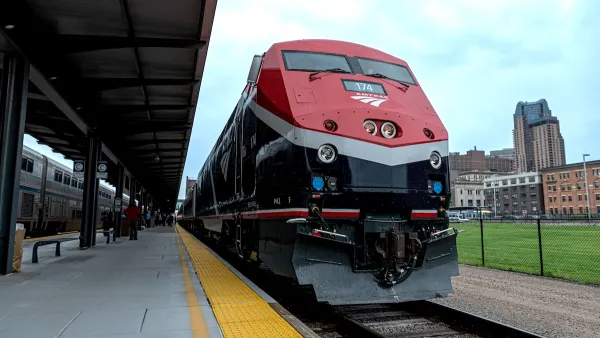Dirty looks, shushing, even brawls; the lengths that "vigilantes" take to policing the rules of railroad quiet-cars can be extreme. William Power and Brian Hershberg look at how different transit systems, and their passengers, enforce quiet rides.
In this age of smartphones, tablets, and personal audio systems, finding a respite from the cacophony can be a challenge. But, as Power and Hershberg note, "In theory, and often in reality, the quiet car has been a haven for commuters seeking peace. Passengers who desire quiet stay in a designated car, and chatty types in the rest."
Yet, with many systems relying on self enforcement, "passenger-on-passenger policing is just what can happen as the quiet-car concept continues to expand to more railroad lines. Best-known on Amtrak, the shhh-cars are an option on local train lines in places including New York, Pennsylvania, Virginia, Illinois and California. While some of the quiet cars have clear signs with the rules, others roll up with none."
"One of the biggest myths about quiet cars, say transit officials, is that the rules have legal authority," explain Power and Hershberg. "Most of the time, the quiet ride relies on riders to voluntarily comply—by talking in 'library voice' and disabling sounds on all electronic devices."
"Septa, for example, says riders shouldn't expect to hear a pin drop. 'It's the quiet car, not the silent car,' says Kim Scott Heinle, assistant general manager for customer service and advocacy."
FULL STORY: Shhh! 'Quiet Cars' Turn Commuters Into Librarians

Planetizen Federal Action Tracker
A weekly monitor of how Trump’s orders and actions are impacting planners and planning in America.

Maui's Vacation Rental Debate Turns Ugly
Verbal attacks, misinformation campaigns and fistfights plague a high-stakes debate to convert thousands of vacation rentals into long-term housing.

Restaurant Patios Were a Pandemic Win — Why Were They so Hard to Keep?
Social distancing requirements and changes in travel patterns prompted cities to pilot new uses for street and sidewalk space. Then it got complicated.

In California Battle of Housing vs. Environment, Housing Just Won
A new state law significantly limits the power of CEQA, an environmental review law that served as a powerful tool for blocking new development.

Boulder Eliminates Parking Minimums Citywide
Officials estimate the cost of building a single underground parking space at up to $100,000.

Orange County, Florida Adopts Largest US “Sprawl Repair” Code
The ‘Orange Code’ seeks to rectify decades of sprawl-inducing, car-oriented development.
Urban Design for Planners 1: Software Tools
This six-course series explores essential urban design concepts using open source software and equips planners with the tools they need to participate fully in the urban design process.
Planning for Universal Design
Learn the tools for implementing Universal Design in planning regulations.
Heyer Gruel & Associates PA
JM Goldson LLC
Custer County Colorado
City of Camden Redevelopment Agency
City of Astoria
Transportation Research & Education Center (TREC) at Portland State University
Jefferson Parish Government
Camden Redevelopment Agency
City of Claremont





























